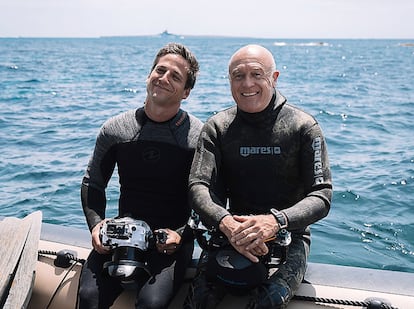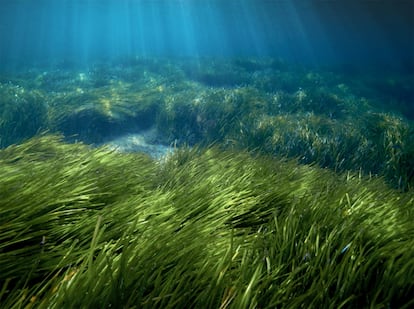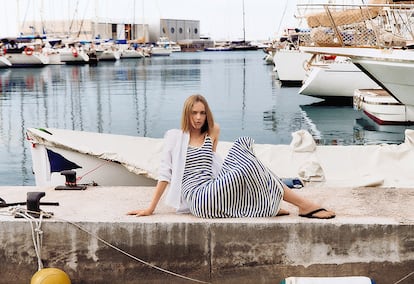Manu San Félix, marine biologist: ‘We bathe and fish in seas where huge amounts of unrefined water are dumped’
The Spanish retailer Mango has joined hands with Manu San Félix to help protect ‘Posidonia oceanica,’ commonly known as Neptune grass. EL PAÍS spoke with the marine biologist to discuss the dangers facing the Mediterranean Sea

1981 was a key year in the life of Manu San Félix, a 59-year-old marine biologist and National Geographic explorer. This was when he had the opportunity to make his first dive in the Mediterranean Sea. During the underwater experience, he discovered Posidonia (Posidonia oceanica) — commonly known as Neptune grass — and was so amazed by this unique plant that he decided to move to the Spanish island of Formentera, so that he could dedicate his life to protecting it.
“Posidonia is a superior plant: it has a root, stem, leaves and the ability to flourish under water. And, in Formentera, we have kilometers of meadows of this plant, which are similar to grass and which release large amounts of oxygen,” explains the Madrid-born San Félix. “Posidonia meadows make up the most efficient natural system on the planet. The plant absorbs carbon dioxide from the atmosphere through photosynthesis. One square meter of a Posidonia meadow absorbs as much carbon as 15 square meters of Amazon rainforest. This figure is spectacular. It also creates a habitat that hundreds of species depend on.”

Wherever there’s Posidonia, the waters are naturally crystalline: it acts as a lung and a natural treatment plant for the seas. But its marked decline in recent decades has alarmed environmentalists. “The decline began in the 1970s and 1980s, which is when there was a great tourist development on the coast. The construction of ports, promenades, artificial beaches and hundreds of houses and hotels was allowed. This tourism explosion didn’t include planning a good wastewater system, meaning that huge amounts of unrefined or insufficiently purified water were dumped into the Mediterranean. Despite the fact that it’s very unintelligent to dump poorly purified water into the sea — which destroys the Posidonia and the rest of the ecosystem — it has been done. And we’re talking about the water where we bathe and fish,” the marine biologist laments. “Lastly, thousands of ship anchors uprooting the Posidonia in high season have also caused irreparable damage to these meadows.”
In his efforts to save the underwater Posidonia meadows, Manu San Félix has joined forces with the Spanish retailer Mango to create a pioneering project to replant this species through the Vellmarí Association. To finance this, Mango has designed a solidarity shirt and trousers, with the motto: “From the sea, for the sea,” the profits of which will go entirely to this cause. These garments — designed in Barcelona and made in Morocco — are made from a mixture of algae and wood cellulose, mixed with cotton.
“Brands like Mango are very important to our project. They have a great platform to be able to transmit the message, so that people understand the reasons why it’s essential to take care of our seas. The fashion industry has a great ability to attract attention. This alliance with Mango is crucial to reaching people and making them aware,” the marine biologist affirms.
The initiative is part of Mango’s social commitment. The company has always been closely linked to the Mediterranean and caring for the environment. Its leadership has proposed a sustainability strategy, with clear objectives to be achieved by 2030: fighting against climate change, reducing water consumption, using responsible packaging and helping protect biodiversity.

But time is running out, and the damage being done is enormous. But Manu San Félix — who has been nicknamed “the Posidonia warrior” for his efforts — is clear about what a good action plan to protect the meadows would consist of.
“This year, we have the ambitious goal of planting 3,000 plants. We’re already collecting the weeds that reach the beaches and contain seeds, which will be replanted at the bottom of the sea. It’s a slow and difficult process, so it’s essential that — in addition to replanting — we focus our efforts on not continuing to destroy the ecosystem. We have the technology and knowledge to purify the water properly, but we need the commitment of politicians to look at the long-term. There’s a lot of institutional neglect that cannot be resolved in a four-year [legislative session]. A good water treatment project can take 10 or 15 years. You have to think about the benefits that can last forever.”
Sign up for our weekly newsletter to get more English-language news coverage from EL PAÍS USA Edition
Tu suscripción se está usando en otro dispositivo
¿Quieres añadir otro usuario a tu suscripción?
Si continúas leyendo en este dispositivo, no se podrá leer en el otro.
FlechaTu suscripción se está usando en otro dispositivo y solo puedes acceder a EL PAÍS desde un dispositivo a la vez.
Si quieres compartir tu cuenta, cambia tu suscripción a la modalidad Premium, así podrás añadir otro usuario. Cada uno accederá con su propia cuenta de email, lo que os permitirá personalizar vuestra experiencia en EL PAÍS.
¿Tienes una suscripción de empresa? Accede aquí para contratar más cuentas.
En el caso de no saber quién está usando tu cuenta, te recomendamos cambiar tu contraseña aquí.
Si decides continuar compartiendo tu cuenta, este mensaje se mostrará en tu dispositivo y en el de la otra persona que está usando tu cuenta de forma indefinida, afectando a tu experiencia de lectura. Puedes consultar aquí los términos y condiciones de la suscripción digital.









































